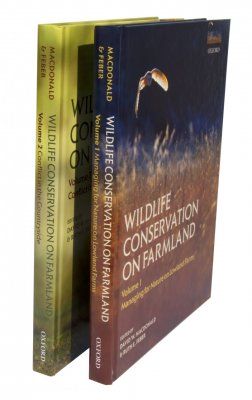Sprawdź czasy i koszty wysyłki
OXFORD
9780199646838
Wildlife Conservation on Farmland
David W Macdonald, Ruth E Feber
twarda okładka
This innovative two-volume book highlights and examines the most important challenges facing farmers, conservationists, and policy makers, using examples of real-life, linked studies from a farmed landscape, which bridge the divide between the theory and practice of wildlife conservation on farmland.
This set brings together Volume 1: Managing for Nature on Lowland Farms and Volume 2: Conflict in the Countryside.
Volume 1 Using more than 30 years research from the author team at the Wildlife Conservation Research Unit (WildCRU), Wildlife Conservation on Farmland reveals how agricultural systems and wildlife interact, presenting examples from scales varying from landscape to microcosm, from populations to individuals, covering plants, invertebrates, birds, and mammals. It demonstrates the essential ecosystem services provided by agricultural land, and discusses the implications of agricultural development for natural habitats and biodiversity.
Volume 2 Many of the encounters between farming and wildlife, especially vertebrates, involve some level of conflict which can cause disadvantage to both the wildlife and the people involved. Through a series of WildCRU case-studies, Wildlife Conservation on Farmland investigates the sources of the problems, and ultimately of the threats to conservation, discussing a variety of remedies and mitigations, and demonstrating the benefits of evidence-based, inter-disciplinary policy.
TOM I
Managing for Nature in Lowland Farms
1: David W. Macdonald, Eva M. Raebel and Ruth E. Feber: Farming and wildlife: a perspective on a shared future
2: Helen Smith, Ruth E. Feber and David W. Macdonald: From weed reservoir to wildlife resource: redefining arable field margins
3: Ruth E. Feber, Paul J. Johnson, Fran H. Tattersall, Will Manley, Barbara Hart, Helen Smith and David W. Macdonald: How can field margin management contribute to invertebrate biodiversity?
4: David W. Macdonald, Lauren A. Harrington, Merryl Gelling, Fran H. Tattersall and Tom Tew: Small mammals on lowland farmland
5: Jeremy D. Wilson and Richard B. Bradbury: Agri-environment schemes and the future of farmland bird conservation
6: Ruth E. Feber, Paul J. Johnson, Dan E. Chamberlain, Leslie G. Firbank, Robert J. Fuller, Barbara Hart, Will Manley, Fiona Mathews, Lisa R. Norton, Martin Townsend and David W. Macdonald: Does organic farming affect biodiversity?
7: Hanna L. Tuomisto, Ian D. Hodge, Philip Riordan and David W. Macdonald: Farming for the future: optimising farming systems for society and the environment
8: Thomas Merckx and David W. Macdonald: Landscape-scale conservation of farmland moths
9: Danielle Linton, Lauren A. Harrington and David W. Macdonald: Habitat use by vesper bats: disentangling local and landscape scale effects within lowland farmland
10: Eva M. Raebel, David J. Thompson and David W. Macdonald: Local and landscape scale management of Odonata
11: Rosalind F. Shaw, Alison E. Poole, Ruth E. Feber, Eva M. Raebel and David W. Macdonald: Freshwaters and farming: impacts of land use and management on the biodiversity of rivers and ditches
12: Christina D. Buesching, Eleanor M. Slade, Thomas Merckx and David W. Macdonald: Local and landscape-scale impacts of wooded habitats and their management on wildlife
13: Elina Rantanen, David W. Macdonald, Nick Sotherton and Francis Buner: Improving reintroduction success of the Grey Partridge using behavioural studies
14: Tom P. Moorhouse, Merryl Gelling and David W. Macdonald: Water vole restoration in the Upper Thames
15: Tom Moorhouse, David W. Macdonald, Rob Strachan and Xavier Lambin: What does conservation research do, when should it stop, and what do we do then? Questions answered with water voles.
16: Christopher J. Sandom and David W. Macdonald: What next? Rewilding as a radical future for the British countryside
TOM II
Conflict in the Countryside
1: David W. Macdonald, Eva M. Raebel, Chris Newman and Ruth E. Feber: War or Peace: farming and wildlife
2: David W. Macdonald, Patrick Doncaster, Malcolm Newdick, Heribert Hofer, Fiona Mathews, Paul J. Johnson: Foxes in the landscape: ecology and sociology
3: David W. Macdonald and Paul J. Johnson: Foxes in the landscape: hunting, control and economics
4: David W. Macdonald, Chris Newman and Christina D. Buesching: Badgers in the rural landscape: conservation paragon or farmland pariah: lessons from the Wytham Badger Project
5: David W. Macdonald, Rosie Woodroffe and Philip Riordan: Badgers and Bovine Tuberculosis: beyond perturbation to life cycle analysis 6: David W. Macdonald, Lauren A. Harrington, Nobuyuki Yamaguchi, Mike D. Thom, Joanna Bagniewska: Biology, ecology and reproduction of American mink Neovison vison on lowland farmland
7: Lauren A. Harrington and David W. Macdonald: Riparian mustelids in the Upper Thames: a case of alien invasives versus native competitors
8: Tom P. Moorhouse and David W. Macdonald: Crayfish management in the Upper Thames
9: Alan Larkman, Ruth E. Feber, Ian Newton and David W. Macdonald: Population trends in large and small resident, seed-eating farmland bird species in Britain since 1966
10: Eduardo Arraut, David W. Macdonald and Robert E. Kenward: In the wake of buzzards: from modelling to conservation and management in a changing landscape
11: David W. Macdonald, Manuel Berdoy and Joanne P. Webster: Brown rats on farmland: ecological citizens or subsidised carpet-baggers?
12: Sandra E. Baker and David W. Macdonald: Moles on farmland: making mountains out of molehills?
13: Sandra E. Baker and David W. Macdonald: Managing wildlife humanely with learned food aversions
14: Philip Riordan, Paul Johnson, Eva Raebel, Ruth E. Feber and David W. Macdonald: From science to practice: delivering conservation across the landscape
15: Christina D. Buesching, Eleanor M. Slade, Chris Newman, Terhi Riutta, Philip Riordan and David W. Macdonald: Many Hands Make Light Work - But Do They? A Critical Evaluation of Citizen Science
| Autor | David W Macdonald, Ruth E Feber |
| Tytuł | Wildlife Conservation on Farmland |
| Objętość | 647 stron [2 tomy] |
| Okładka | twarda |
| Wymiary | mm |
| Wydawnictwo | OXFORD |
| Termin wydania | 2015 [lipiec] |
| Uwagi | tekst, tabele, 249 cz-b ilustracji |



 Wydawnictwa
Wydawnictwa




